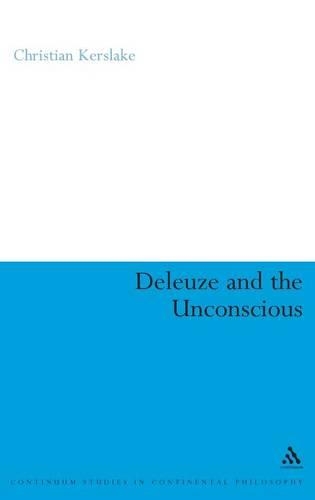
Deleuze and the Unconscious
(Hardback)
Publishing Details
Deleuze and the Unconscious
By (Author) Dr Christian Kerslake
Bloomsbury Publishing PLC
Continuum International Publishing Group Ltd.
8th March 2007
United Kingdom
Classifications
Tertiary Education
Non Fiction
Philosophy of mind
150.195
Physical Properties
Hardback
256
Width 156mm, Height 234mm
540g
Description
By the end of the twentieth century, it had been almost forgotten that the Freudian account of the unconscious was only one of many to have emerged from the intellectual ferment of the second half of the 19th century. The philosophical roots of the concept of the unconscious in Leibniz, Kant, Schelling and Schopenhauer had also been occluded from view by the dominance of Freudianism. From his earliest work of the 1940s until his final writings of the 1990s, Gilles Deleuze stood at odds with this dominant current, rejecting Freud as sole source for ideas about the unconscious.This most 'contemporary' of French philosophers acted as custodian of all the ideas that had been rejected by the proponents of the psychoanalytic model, carefully preserving them and, when possible, injecting them with new life.In 1950s and 60s Deleuze turned to Henri Bergson's theories of memory and instinct and to Carl Jung's theory of archetypes. In Difference and Repetition (1968) he conceived of a 'differential unconscious' based on Leibnizian principles. He was also immersed from the beginning in esoteric and occult ideas about the nature of the mind. Deleuze and the Unconscious shows how these tendencies combine in Deleuze's work to engender a wholly new approach to the unconscious, for which active relations to the unconscious are just as important as the better known pathologies of neurosis and psychosis.
Reviews
-Mention. The Chronicle of Higher Education/ July 13, 2007
"This book, beyond being a superior work of scholarship, reveals an entire network of decisive investments and influences, scarcely grasped before, which underpin the entire course of Deleuze's philosophy. Kerslake's book is a landmark in English-language Deleuze scholarship, whose merits are many, and which thoroughly deserves to be widely read and discussed...The greatest promise of Kerslake's exceptional book is that Deleuze's philosophy will be turned to in all its richness and paradox. Without a doubt, there have been some very fine contributions to English-speaking Deleuze scholarship, but Kerslake has set a new high watermark." -Jonathan Roffe, Philosophy in Review
Author Bio
Christian Kerslake is Research Fellow at the Centre for Research in Modern European Philosophy, Middlesex University, UK.His publications include Immanence and the Vertigo of Philosophy(EdinburghUniversity Press, 2009).
